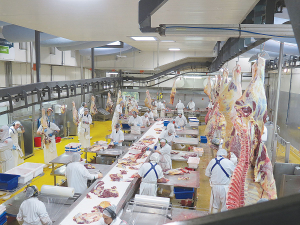Super cow
OPINION: Brazil has hundreds of millions of cows (234.4 million head at the last census) but one is extraordinary.
 Brazil has the world’s largest commercial cattle herd and is the world’s second largest beef exporter.
Brazil has the world’s largest commercial cattle herd and is the world’s second largest beef exporter.
A case of atypical bovine spongiform encephalopathy (BSE) in Brazil has resulted in temporary export suspensions from that country - as well as renewed international calls for increased transparency.
The case in question was reported in a nine-year-old bull in the state of Para on February 22. Atypical BSE differs from classical BSE in that it is a rare, spontaneous genetic mutation and almost exclusively found in older cattle. Classic BSE is caused by feeds contaminated by meat and bones from animals infected with classic or atypical BSE.
On February 23, Brazil voluntarily shut down beef exports to China, with several other countries also suspending Brazilian imports during this period.
That seemed a speedy response, until a look at the World Organization for Animal Health (WOAH) event submission form revealed that the start of the event was listed as January the 18th - 35 days before the case was reported. MPI says a potential New Zealand case of a WOAH exotic-listed disease means we would be obliged to report it within 24 hours.
This is not the first time Brazil has been late in reporting BSE cases. Previous reported instances in 2021, 2019, 2014 and 2012 have also shown late reporting of atypical BSE confirmations, with one instance in 2012 taking over two years to report.
Despite engaging with the Brazilian beef industry through several industry groups, Beef+Lamb NZ's senior manager of international trade Frances Duignan says the organisation had been unaware of this information.
"Rapid reporting is an expectation we have of all WOAH members, because it is key to minimising spread," she told Rural News.
Nonetheles, Duignan expressed "confidence" in the WOAH's ability to resolve reporting issues with member nations.
In November 2021, after two reported BSE cases in Brazil that year, three US Senators introduced a bill aiming to suspend beef imports from Brazil until a review of Brazilian beef's impact on food safety could be conducted. The bill did not pass, but just das before last month's report from Brazil they announced an attempt to re-introduce the bill into Congress.
Brazil has the world's largest commercial cattle herd (22.2% of global cattle numbers) and is the world's second largest beef exporter (15.4%). Because atypical BSE is rare, unpredictable and predominantly found in older cattle, Brazilian beef is considered "negligible risk" by the WOAH.
Brazil's Minister for Agriculture Carlos Favaro says they aim to resume exports of beef products to China by late March, in time or President da Silva's state visit. This in comparison to 2021 when exports did not resume for three months after reporting date of a BSE infection.
Both MPI and B+LNZ were unable to comment on matters regarding Brazil-China relations.
Duignan says New Zealand accounts for approximately 5% of Chinese beef imports and that in previous occasions of suspensions, Brazilian export numbers quickly returned to normal once suspensions lifted.
The red meat sector finds itself in "a very rare set of circumstances", says Federated Farmers meat and wool industry chair Richard Dawkins.
Agrisea NZ has appointed Craig Hudson as it's new chief growth officer.
State farmer Landcorp, trading as Pamu, is a forecasting a full-year net profit of around $100 million.
Tony Aitken, chief executive of Ruralco, has been awarded the Excellence in Business Leadership Award at the ANZ Business of the Year Awards.
Global trade has been thrown into another bout of uncertainty following the overnight ruling by US Supreme Court, striking down President Donald Trump's decision to impose additional tariffs on trading partners.
Controls on the movement of fruit and vegetables in the Auckland suburb of Mt Roskill have been lifted.

OPINION: Here w go: the election date is set for November 7 and the politicians are out of the gate…
OPINION: ECan data was released a few days ago showing Canterbury farmers have made “giant strides on environmental performance”.